中考一轮复习牛津英语7A Unit 4 Food 知识点归纳
文档属性
| 名称 | 中考一轮复习牛津英语7A Unit 4 Food 知识点归纳 | 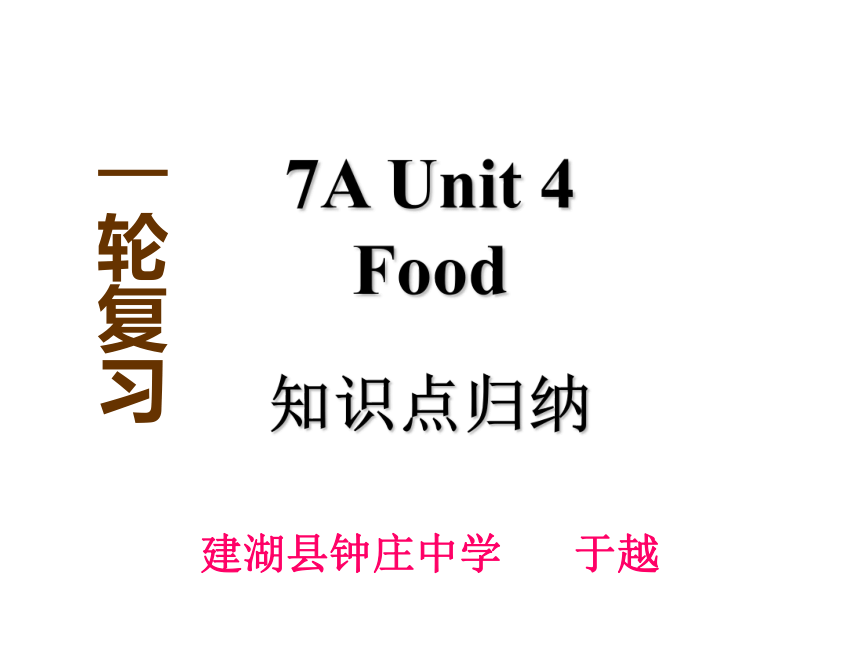 | |
| 格式 | rar | ||
| 文件大小 | 340.6KB | ||
| 资源类型 | 教案 | ||
| 版本资源 | 通用版 | ||
| 科目 | 英语 | ||
| 更新时间 | 2009-03-18 14:31:00 | ||
图片预览

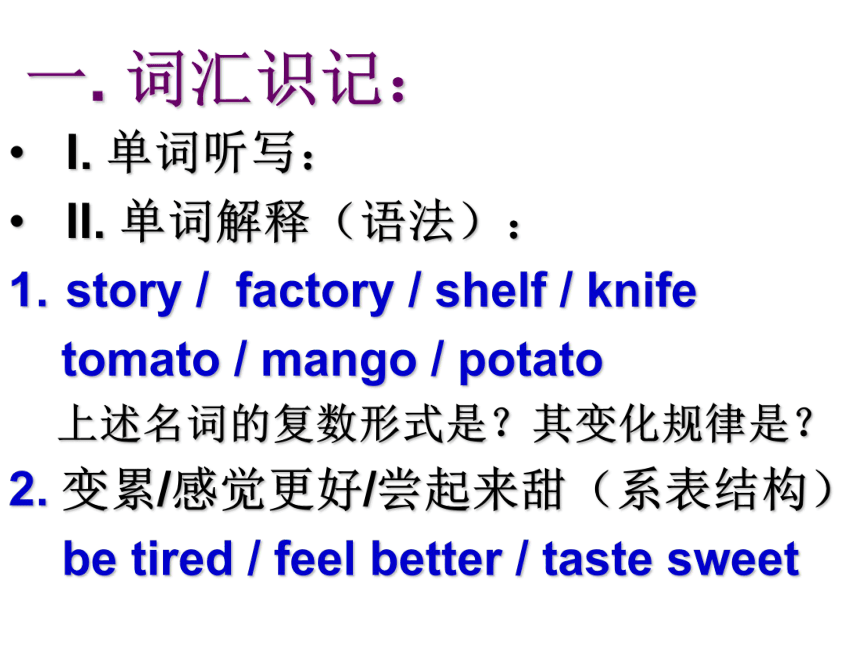
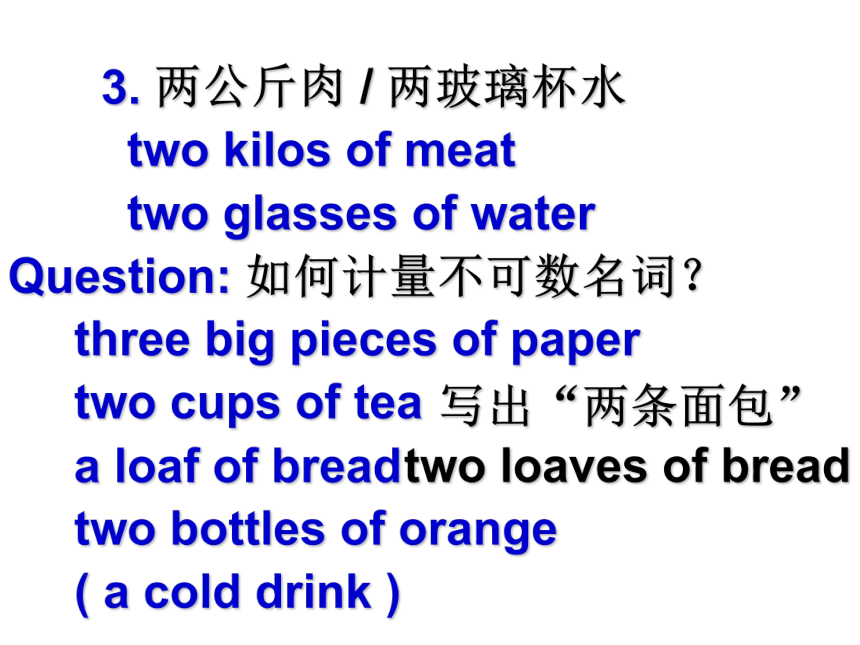
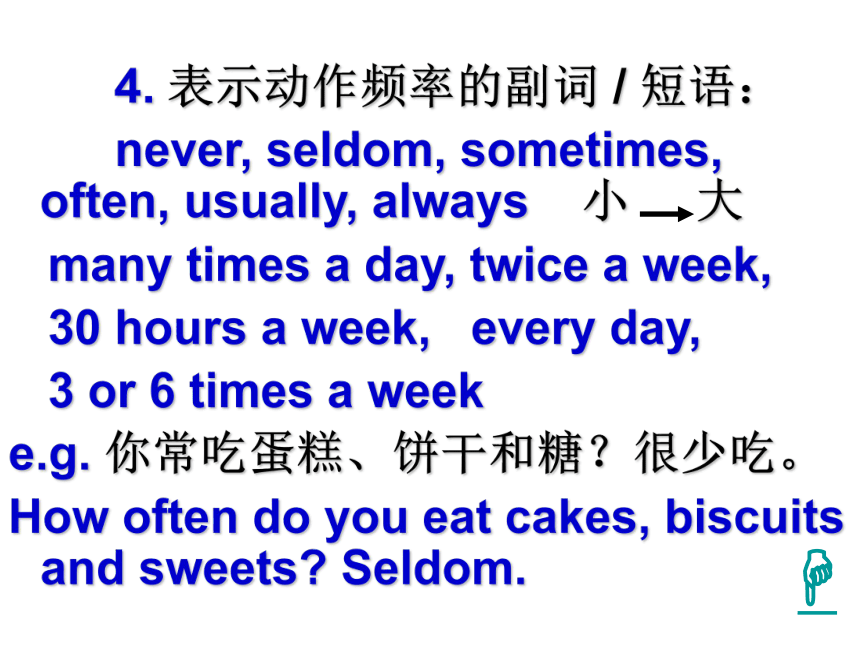
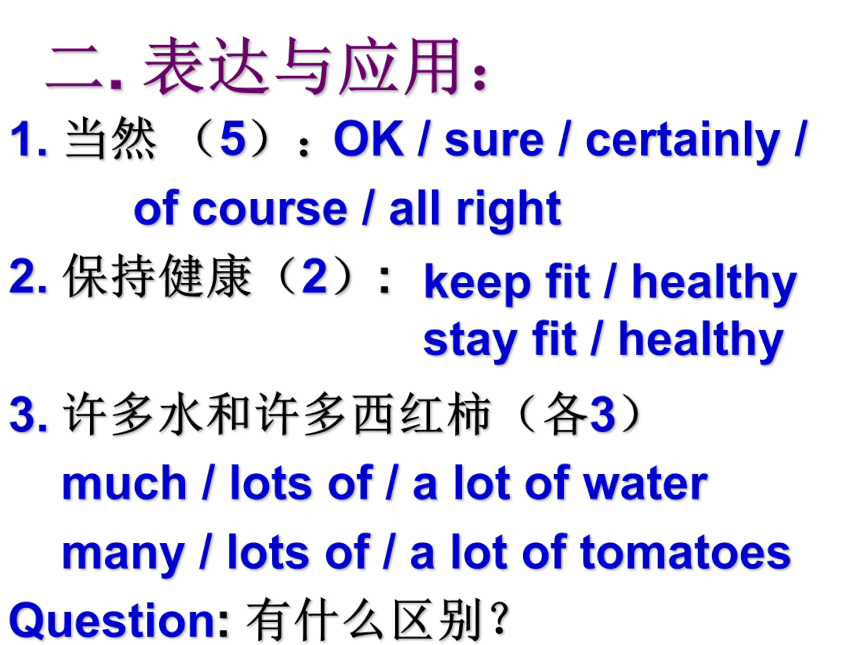
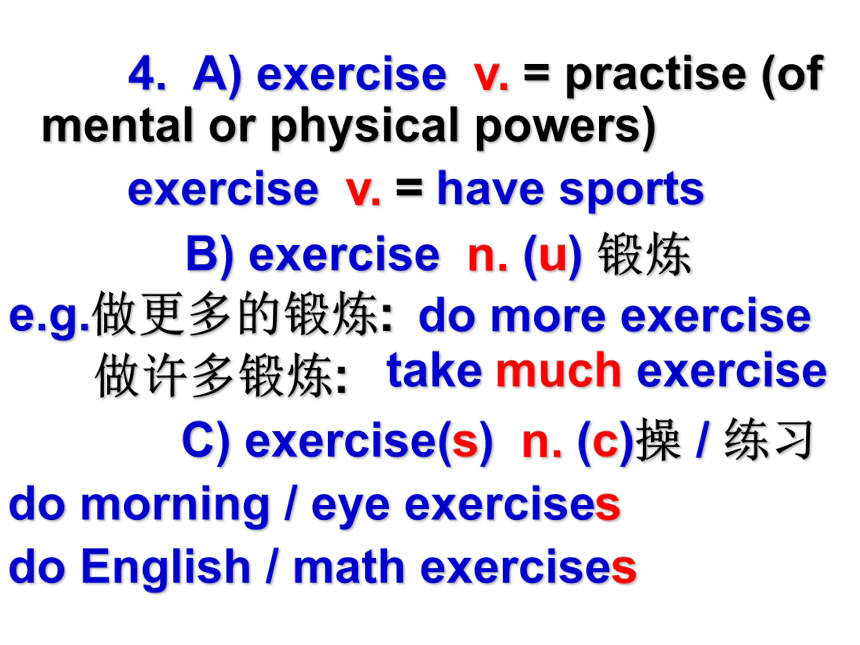
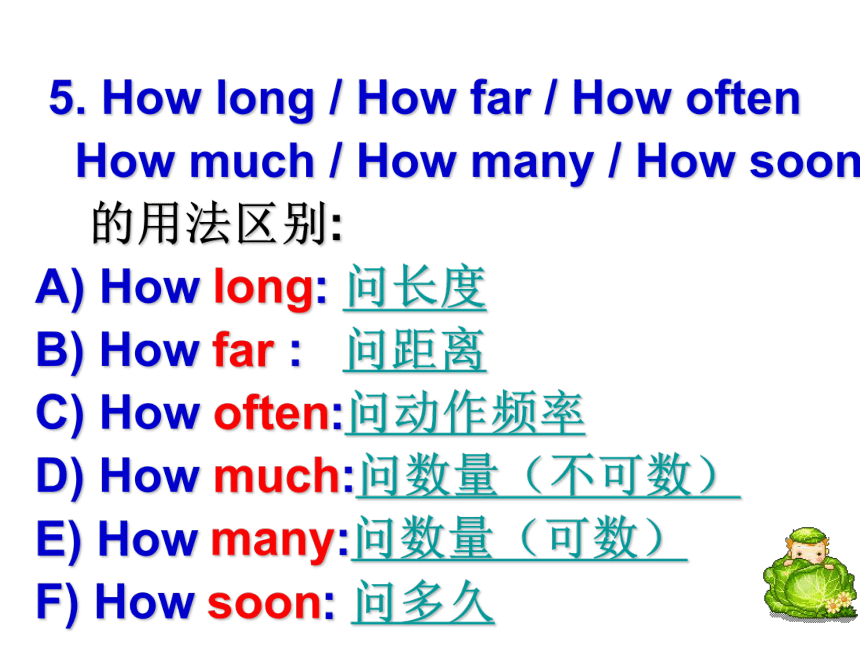
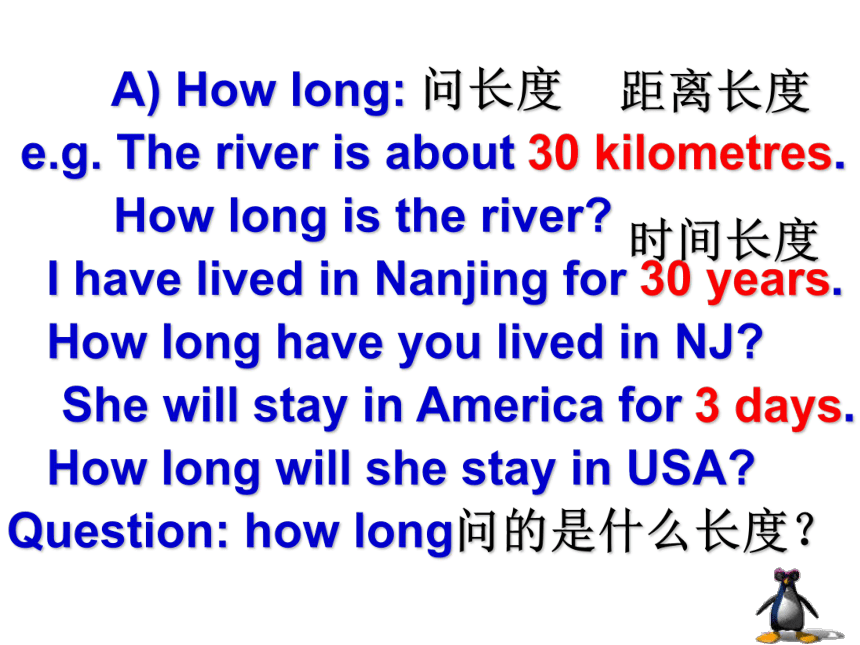
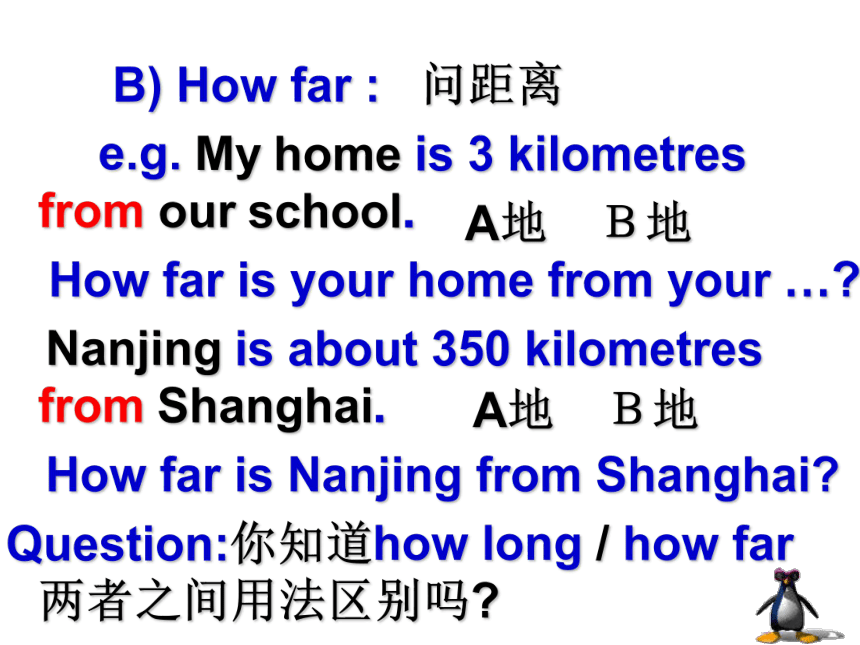
文档简介
课件25张PPT。7A Unit 4
Food 知识点归纳一轮复习 建湖县钟庄中学 于越一. 词汇识记:I. 单词听写:
II. 单词解释(语法):
story / factory / shelf / knife
tomato / mango / potato
上述名词的复数形式是?其变化规律是?
2. 变累/感觉更好/尝起来甜(系表结构)
be tired / feel better / taste sweet 3. 两公斤肉 / 两玻璃杯水
two kilos of meat
two glasses of water
Question: 如何计量不可数名词?
three big pieces of paper
two cups of tea
a loaf of bread
two bottles of orange
( a cold drink ) 写出“两条面包”two loaves of bread 4. 表示动作频率的副词 / 短语:
never, seldom, sometimes, often, usually, always 小 大
many times a day, twice a week,
30 hours a week, every day,
3 or 6 times a week
e.g. 你常吃蛋糕、饼干和糖?很少吃。
How often do you eat cakes, biscuits and sweets? Seldom.?1. 当然 (5):
2. 保持健康(2):
3. 许多水和许多西红柿(各3)
much / lots of / a lot of water
many / lots of / a lot of tomatoes
Question: 有什么区别?
二. 表达与应用: OK / sure / certainly /
of course / all right keep fit / healthy
stay fit / healthy 4. A) exercise v. = practise (of mental or physical powers)
exercise v. = have sports
e.g.做更多的锻炼:
C) exercise(s) n. (c)操 / 练习
do morning / eye exercises
do English / math exercisesdo more exercise做许多锻炼:take much exercise B) exercise n. (u) 锻炼 5. How long / How far / How often
How much / How many / How soon
的用法区别:
A) How long: 问长度
B) How far : 问距离
C) How often:问动作频率
D) How much:问数量(不可数)
E) How many:问数量(可数)
F) How soon: 问多久 A) How long: 问长度
e.g. The river is about 30 kilometres.
How long is the river?
I have lived in Nanjing for 30 years.
How long have you lived in NJ?
She will stay in America for 3 days.
How long will she stay in USA?
Question: how long问的是什么长度?
距离长度时间长度 B) How far : 问距离
e.g. My home is 3 kilometres from our school.
How far is your home from your …?
Nanjing is about 350 kilometres from Shanghai.
How far is Nanjing from Shanghai?
Question:你知道how long / how far 两者之间用法区别吗?A地 B地A地 B地 C) How often:问动作频率
e.g.I walk to my bowl many times a day.
How often do you walk to your bowl?
Kitty seldom ate fruit and vegetables.
How often did Kitty eat fruit and …?
Miss Xu climbs the hill once a week.
How often does Miss Xu climb the ..?
Question: 你还能记住哪些频度副词和短语? D) How much:问数量(不可数)
e.g. I want to buy some bread.
How much bread do you want to buy?
Poor people need much water and food to survive in Africa.
How much water and food do …?
I want to buy some loaves of bread.
How many loaves of bread do you want to buy?
E) How many:问数量(可数)
e.g. There are more than 400 students in Grade 3 in our school.
How many students are there in Grade 3 in our school?
Correct the mistakes:
1. How much pieces of paper do you have?
2. How many news does the teacher tell you?manymuch F) How soon: 问多久
e.g. Her dad will be back in a week.
How soon will her dad be back?
She will come here in a quarter.
How soon will she come here?
区别:She has been dead for 3 days.
How long has she been dead?
Question: 你知道用how soon提问的句型有何特点吗?
三.重点句型与日常话题:1. “花费”的表达:
2. “最喜欢”的表达:
3. “不喜欢”的表达:
4. “做某事有益/有害”的表达:
5. “不再…”的表达:
6. “一点也不”的表达:
7.”想做某事”的表达:
8. do sth. with / without (doing) sth.1. “花费”的表达:e.g. Tom用40万买了这套房子。
1) spend…on sth.=spend…doing sth.
2) pay…for 3) cost 4) take
Tom spent 400,000 ¥on the house.
=Tom spent 400,000 ¥ buying the …
=Tom paid 400,000 ¥ for the house.
=The house cost Tom 400,000 ¥.
=It took Tom 400,000 ¥ to buy the …你知道有哪些动词可以表示“花费”吗?
Question: 你知道这四种句型的特点吗?
spend
pay…for
cost
take
Cor. Mr Ji cost ¥ 569 for his robot.
1)Mr Ji paid ¥ 569 for his robot.
2)Mr Ji spent ¥ 569 on his robot.
3)Mr Ji’s robot cost him 569 ¥.
4)It took Mr Ji ¥ 569 to buy his robot.两个句型的主语都是人!该句型的主语是物!该句型的主语是it 或所做的事!1. “花费”的表达:×2. “最喜欢”的表达:e.g. 他最喜欢西红柿。
1) He likes tomatoes best. =?
2) He likes tomatoes most. =?
3) Tomatoes are his favourite.
e.g.这个女孩最喜欢编中国结。
The girl likes weaving Chinese knots best.
Sum up:
like sth. best = like sth. most =
sth. is one’s favourite. 3. “不喜欢”的表达: e.g. 他不爱吃鱼。
He doesn’t like (eating) fish.= ?
He dislikes fish.=?
e.g.女孩子通常不喜欢玩电脑游戏。
Girls usually don’t like playing computer games.
=Girls usually dislike playing … .
=Girls usually hates playing … .
Sum up:
don’t like sth = dislike sth = hate sthHe hates fish.4. “做某事有益/有害”的表达:e.g. 蔬菜对我有益。吃很多肉对他没好处。
It’s good for me to eat vegetables.
It’s bad for him to have much meat.
e.g. 对舞蹈演员来说健康是很重要的。
It’s important for a dancer to be healthy.
Sum up:
It’s + adj. for sb to do sth. 思考: 该句型 = ?5. “不再…”的表达:e.g. 我们不再是孩子了。
我午饭不再吃汉堡了。
Sum up:We are no longer children.=We are not children any longer.I no longer eat hamburgers. =I don’t eat hamburgers any longer.A. no longer 的位置1) be + no longer / no more
2) no longer / no more + v. B. no longer 的近义词组 6. “一点也不”的表达:e.g. 你一点都不胖。
You are not fat at all.
她一点也不喜欢汉堡。
She does not like hamburgers at all.
Question:那么“有点…”如何表达呢?
You are a little / a bit fat.
She likes hamburgers a little.
Note: not a little = very
e.g.我非常累. Sum up:
一点也不
not … at all I’m very tired.I’m not a little tired.7.”想做某事”的表达:e.g. 我想做歌唱家。我想健康一些。
I would like to be a singer.= ?
I want to become a singer.
I would like to be more healthier.=?
Sum up:
would like to do = want to do =?
扩展:feel like doing sth.
你能用第三种句型表示上两句吗?8. do sth. with / without (doing) sth.e.g. 我午饭就着鱼还吃一个苹果。
I have rice with fish and an apple for lunch.
你可以喝它,不会变胖的。
You can drink it without getting fat.
Fill in the blanks:
You shouldn’t go to school ________
having breakfast.
Must students go to school _______
their bags?withoutwith四. 话题写作提纲( My health diet ): 1.What was your diet before?
2. How about now?
3. How often do you exercise?
4. What do you do every day?
Notes: 1)注意分段;
2)时态正确;
3)了解相关的食物热量信息五. Homework: I.订正词汇听写错误;
II. 复习7A Unit 5 :
词汇 / 课文 / 语法 / 写作
准备明天的复习!
II. 单词解释(语法):
story / factory / shelf / knife
tomato / mango / potato
上述名词的复数形式是?其变化规律是?
2. 变累/感觉更好/尝起来甜(系表结构)
be tired / feel better / taste sweet 3. 两公斤肉 / 两玻璃杯水
two kilos of meat
two glasses of water
Question: 如何计量不可数名词?
three big pieces of paper
two cups of tea
a loaf of bread
two bottles of orange
( a cold drink ) 写出“两条面包”two loaves of bread 4. 表示动作频率的副词 / 短语:
never, seldom, sometimes, often, usually, always 小 大
many times a day, twice a week,
30 hours a week, every day,
3 or 6 times a week
e.g. 你常吃蛋糕、饼干和糖?很少吃。
How often do you eat cakes, biscuits and sweets? Seldom.?1. 当然 (5):
2. 保持健康(2):
3. 许多水和许多西红柿(各3)
much / lots of / a lot of water
many / lots of / a lot of tomatoes
Question: 有什么区别?
二. 表达与应用: OK / sure / certainly /
of course / all right keep fit / healthy
stay fit / healthy 4. A) exercise v. = practise (of mental or physical powers)
exercise v. = have sports
e.g.做更多的锻炼:
C) exercise(s) n. (c)操 / 练习
do morning / eye exercises
do English / math exercisesdo more exercise做许多锻炼:take much exercise B) exercise n. (u) 锻炼 5. How long / How far / How often
How much / How many / How soon
的用法区别:
A) How long: 问长度
B) How far : 问距离
C) How often:问动作频率
D) How much:问数量(不可数)
E) How many:问数量(可数)
F) How soon: 问多久 A) How long: 问长度
e.g. The river is about 30 kilometres.
How long is the river?
I have lived in Nanjing for 30 years.
How long have you lived in NJ?
She will stay in America for 3 days.
How long will she stay in USA?
Question: how long问的是什么长度?
距离长度时间长度 B) How far : 问距离
e.g. My home is 3 kilometres from our school.
How far is your home from your …?
Nanjing is about 350 kilometres from Shanghai.
How far is Nanjing from Shanghai?
Question:你知道how long / how far 两者之间用法区别吗?A地 B地A地 B地 C) How often:问动作频率
e.g.I walk to my bowl many times a day.
How often do you walk to your bowl?
Kitty seldom ate fruit and vegetables.
How often did Kitty eat fruit and …?
Miss Xu climbs the hill once a week.
How often does Miss Xu climb the ..?
Question: 你还能记住哪些频度副词和短语? D) How much:问数量(不可数)
e.g. I want to buy some bread.
How much bread do you want to buy?
Poor people need much water and food to survive in Africa.
How much water and food do …?
I want to buy some loaves of bread.
How many loaves of bread do you want to buy?
E) How many:问数量(可数)
e.g. There are more than 400 students in Grade 3 in our school.
How many students are there in Grade 3 in our school?
Correct the mistakes:
1. How much pieces of paper do you have?
2. How many news does the teacher tell you?manymuch F) How soon: 问多久
e.g. Her dad will be back in a week.
How soon will her dad be back?
She will come here in a quarter.
How soon will she come here?
区别:She has been dead for 3 days.
How long has she been dead?
Question: 你知道用how soon提问的句型有何特点吗?
三.重点句型与日常话题:1. “花费”的表达:
2. “最喜欢”的表达:
3. “不喜欢”的表达:
4. “做某事有益/有害”的表达:
5. “不再…”的表达:
6. “一点也不”的表达:
7.”想做某事”的表达:
8. do sth. with / without (doing) sth.1. “花费”的表达:e.g. Tom用40万买了这套房子。
1) spend…on sth.=spend…doing sth.
2) pay…for 3) cost 4) take
Tom spent 400,000 ¥on the house.
=Tom spent 400,000 ¥ buying the …
=Tom paid 400,000 ¥ for the house.
=The house cost Tom 400,000 ¥.
=It took Tom 400,000 ¥ to buy the …你知道有哪些动词可以表示“花费”吗?
Question: 你知道这四种句型的特点吗?
spend
pay…for
cost
take
Cor. Mr Ji cost ¥ 569 for his robot.
1)Mr Ji paid ¥ 569 for his robot.
2)Mr Ji spent ¥ 569 on his robot.
3)Mr Ji’s robot cost him 569 ¥.
4)It took Mr Ji ¥ 569 to buy his robot.两个句型的主语都是人!该句型的主语是物!该句型的主语是it 或所做的事!1. “花费”的表达:×2. “最喜欢”的表达:e.g. 他最喜欢西红柿。
1) He likes tomatoes best. =?
2) He likes tomatoes most. =?
3) Tomatoes are his favourite.
e.g.这个女孩最喜欢编中国结。
The girl likes weaving Chinese knots best.
Sum up:
like sth. best = like sth. most =
sth. is one’s favourite. 3. “不喜欢”的表达: e.g. 他不爱吃鱼。
He doesn’t like (eating) fish.= ?
He dislikes fish.=?
e.g.女孩子通常不喜欢玩电脑游戏。
Girls usually don’t like playing computer games.
=Girls usually dislike playing … .
=Girls usually hates playing … .
Sum up:
don’t like sth = dislike sth = hate sthHe hates fish.4. “做某事有益/有害”的表达:e.g. 蔬菜对我有益。吃很多肉对他没好处。
It’s good for me to eat vegetables.
It’s bad for him to have much meat.
e.g. 对舞蹈演员来说健康是很重要的。
It’s important for a dancer to be healthy.
Sum up:
It’s + adj. for sb to do sth. 思考: 该句型 = ?5. “不再…”的表达:e.g. 我们不再是孩子了。
我午饭不再吃汉堡了。
Sum up:We are no longer children.=We are not children any longer.I no longer eat hamburgers. =I don’t eat hamburgers any longer.A. no longer 的位置1) be + no longer / no more
2) no longer / no more + v. B. no longer 的近义词组 6. “一点也不”的表达:e.g. 你一点都不胖。
You are not fat at all.
她一点也不喜欢汉堡。
She does not like hamburgers at all.
Question:那么“有点…”如何表达呢?
You are a little / a bit fat.
She likes hamburgers a little.
Note: not a little = very
e.g.我非常累. Sum up:
一点也不
not … at all I’m very tired.I’m not a little tired.7.”想做某事”的表达:e.g. 我想做歌唱家。我想健康一些。
I would like to be a singer.= ?
I want to become a singer.
I would like to be more healthier.=?
Sum up:
would like to do = want to do =?
扩展:feel like doing sth.
你能用第三种句型表示上两句吗?8. do sth. with / without (doing) sth.e.g. 我午饭就着鱼还吃一个苹果。
I have rice with fish and an apple for lunch.
你可以喝它,不会变胖的。
You can drink it without getting fat.
Fill in the blanks:
You shouldn’t go to school ________
having breakfast.
Must students go to school _______
their bags?withoutwith四. 话题写作提纲( My health diet ): 1.What was your diet before?
2. How about now?
3. How often do you exercise?
4. What do you do every day?
Notes: 1)注意分段;
2)时态正确;
3)了解相关的食物热量信息五. Homework: I.订正词汇听写错误;
II. 复习7A Unit 5 :
词汇 / 课文 / 语法 / 写作
准备明天的复习!
